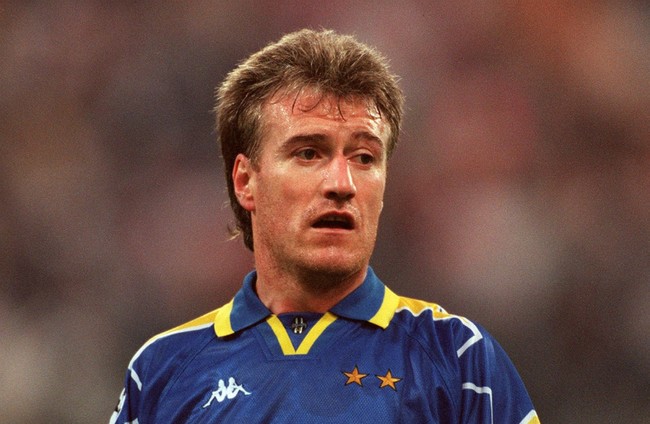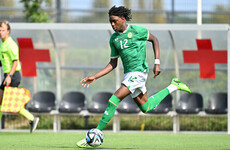THE FOLLOWING PASSAGE is an extract from Zonal Marking: The Making of Modern European Football by Michael Cox.
By the time of France’s double success in 1998 and 2000, they depended on a solid midfield anchorman, Didier Deschamps, who would later become one of only three men to complete the ultimate footballing double, winning the World Cup as both player and manager.
The first was Brazil’s Mário Zagallo in 1958 and 1970, next came Germany’s Franz Beckenbauer in 1974 and 1990, while Deschamps triumphed in 1998 and 2018. Deschamps is the least celebrated of the trio, considered a limited, workmanlike defensive midfielder and a safety-first manager, but his impact on French football is considerable.
Deschamps was frequently described in patronising terms, generally by juxtaposing him unflatteringly with Zidane, his more illustrious midfield colleague. ‘Zidane’s role is more difficult than mine was, because I was blessed with teammates who shared my vision of the game,’ Michel Platini once said, comparing the France of 2000 with his side of 1984.
‘Between Deschamps – who, as we all know, doesn’t exactly move crowds, and who deserves praise for reaching the level he’s at, given his abilities – and Zidane, there’s a fundamental difference.’
Crucially, Deschamps fully understood his limitations. ‘I was never going to be as talented as Zidane,’ he admitted. ‘Instead, I compensated by working a huge amount and helping my team in the best way I could.’
Rather than being a fearsome athlete, Deschamps was a small, slight footballer who excelled because of his positional sense and his selflessness. It would be unreasonable to suggest that Deschamps made the anchorman role cool, but he ensured it was considered necessary, at least in his homeland. Alongside Brazil’s Dunga, he epitomised the understated, workmanlike, solid defensive midfi elder of the 1990s, always working in support of his side’s technical talents.
Deschamps had enjoyed a fine footballing education in the famously prolific academy at Nantes, which also produced Marcel Desailly, Christian Karembeu and Claude Makélélé. Desailly and Deschamps won the Champions League together for Marseille in 1993, while all four moved abroad and played as a defensive midfielder in a victorious Champions League Final: Desailly for AC Milan in 1994, Deschamps for Juventus in 1996, Karembeu for Real Madrid in 1998 and Makélélé for the same club four years later.
Nantes’ academy therefore probably helped to shape the defensive midfield position in modern European football more than any other club, just as Ajax have dominated in terms of ball-playing defenders or Barcelona in terms of deep-lying playmakers.
Nantes might not generally be considered as important as those clubs, but it’s also worth acknowledging their remarkable 2000/01 title success, among the most surprising league victories of this century.
The club had escaped relegation by a single point the previous season and lost their star man, attacking midfielder Antoine Sibierski, but suddenly launched an unexpected title charge under low-key coach Raynald Denoueix, who had spent his entire playing career at the club and worked in their academy for 15 years before becoming manager. Denoueix is probably the most underrated manager of this era, as he later moved to Real Sociedad and guided them to a hugely impressive second-place La Liga finish in 2002/03.
Denoueix’s stint at Nantes was defi ned by his overwhelming belief in youth, with the majority of the starting XI comprising Nantes academy graduates. The Deschamps role was played by the excellent holding midfielder Mathieu Berson, who, along with the energetic Salomon Olembé, supported the elegant playmaker Eric Carrière.
Nantes’ success was short-lived, and they spent the following season battling relegation, but any cycling fans recently converted to football would presumably have been comforted to find the yellow jerseys leading the pack.
As a teenager at Nantes, Deschamps had played as an attacking playmaker, and was renowned for his vision and two-footedness. For France’s youth sides his intelligence meant he was sometimes deployed as a sweeper, a position he enjoyed because he ‘was always facing the play’.
More than anything, though, Deschamps was a true captain. He captained his U16 side at the age of 11, he captained Nantes at the age of 19 and became the youngest-ever Champions League-winning captain with Marseille in 1993 at the age of just 24.
He was oft en considered a skipper as much as an actual footballer, more renowned for his tactical intelligence and leadership skills than his dribbling or passing.
‘Intelligence is what characterises great players, those who win titles,’ said his France teammate Christophe Dugarry. ‘I would cite Didier as an example. Here’s a guy who, to start with, was limited technically but who succeeded in having an exceptional career, thanks to his incredible ability to adapt. His great quality was his analysis, and self-analysis. He was aware of his qualities, and never tried to over-complicate things. He focused on doing the things he did well, very well. He never put his team in danger.’
Extract from Zonal Marking: The Making of Modern European Football by Michael Cox (HarperCollins, £9.99)











United played very well in patches tonight against a stale looking Leicester team. Eriksen is pure class and brings a bit of intelligence and composure to the side. Very early days yet, but progress all the same.
Solid performance, but that was pure crap going forward. Far too passive and almost cocky in attack. Against a rubbish Leicester side who would have been put away by City / Liverpool. Praying Antony lives some bit up to the 100m coz Elanga Rashford Ronaldo nowhere near consistent enough. Highlight of the match was Dalot celebrating the block on Harvey Barnes.. cringey.. but just glad to see any bit of passion in defence these days. 3 wins on the trot we’ll take it. Big improvement needed on Sunday. PS. can see Rodgers at Villa soon!
@Johnny Mads: pretty much
@Johnny Mads: Hats off to ten hag to drop Maguire Johnny. The only way is up. As for yer Rogers quip that’s actually funny and not funny at the same time.
@Johnny Mads: very scrappy at times and alot of work to do, actually thought Ronaldo was lively when he came on, was unlucky with the bicycle kick also, 3 points and a clean sheet
@Pauly Kel: Ronaldo always a danger, just feel he holds back on his forward passed a second too long. Can’t help but feel he’s thinking 2 or 3 steps ahead on how he can give the ball to player best positioned to set him up at the end. Pure paranoia on my behalf but that’s how i always see it ! Sometimes kills the attack. But we sure will take 3 points and move on and keep building.
@Paul Gorry: When i saw him dropped before the pool game i got excited. Felt like a relief to finally move on and take a chance at least. So far paying off. As for Rodgers.. put your house on it ;)
@Johnny Mads: thought Dalot was very good again. Think it’s a bit harsh to lump ronnie in with rashford and elanga, he was on for 20 mins and looked far more threatening than both. If he shot rather than crossed to Eriksen near the end I’m convinced it would have been 2. Jenas saying rashford was on for his work rate was hilarious, did absolutely nowt besides his assist. Surely not a starter for much longer. Mctominay was fairly reckless aswell at times, dragging down maddison on the edge of the box. Surely time to give Fred and Casemiro a run!
@Johnny Mads: probably like the majority of utd fans to be fair. As for Rodgers i don’t have a house lol
@Paul Gorry: rodgers has 102 by all accounts.
@A$AP Ragnick: Dalot gaining confidence off the new system. Glad to see him earn his place ahead of AWB who i cant stand! Prob harsh on Ronnie but jury still out on him for me at moment. We could really do with him hitting form now at the right time so here’s hoping! Ya I think Fred & Casemiro will be the partnership once Casemiro settles. Big test Sunday now gunners on fire.
@Paul Gorry: lol
Leicester reward has beens like Vardy and Evans with new contracts when they should be replaced. The spine of that team needs surgery. New keeper, centre backs, holding midfielder, two strikers. Only six minutes left Brendan. Hurry up !!
Being cautiously optimistic about this upswing in form, this is a side that may give a good run for 4th but ultimately settle for 5th (please anything but 6th again). Arsenal Is the real test if we can topple them then maybe 4th is an actual possibility given that Chelsea seem to be cracking
The big test for this current Utd squad is when they come up against the top teams! Let’s see what happens on Sunday.
@john fairclough: what like Lvpl
@john fairclough: Did they not already beat Liverpool?
@HarveyLemonade: I agree. It will be as equally as big a test for arsenal. They have been impressive but have had a fairly handy first few games.
Pretty irrelevant…. however, United have recorded 3 straight Premier League wins in August/September 2021 and in December 2021.
It’s progress but Ten Haag seems far to cautious when in lead. He brings off pacey attackers for slower defensive players. Happened in last 3 games. Could have easily cost Utd points in each game. This isn’t the Dutch league where teams will accept a 1 0 loss.
@Shane Obrien: I think he’s just getting Casemiro a few minutes here and there for a possible start on Sunday.
@Shane Obrien: think its more of a natural response to united’s tendency to retreat when they get into a lead, i don’t think he is encouraging it or anything. They would have drawn/lost games like this and the Southampton one last year. Hopefully show more of a killer instinct in the upcoming games.